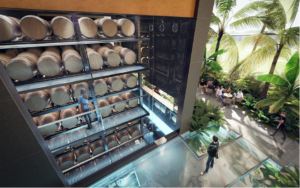
It’s enough to drive an energy investor to drink. A ‘rum and coke’ in Cornwall might soon be sourced coal-bereft and carbon-free, even if the cocktail’s mixer bubbles are pure carbon dioxide.
Meanwhile the famous Ardmore whisky distillery in Aberdeenshire has completed trials to produce green hydrogen on site, as a by-product of its own waste heat and neighbours’ wind power.
Near Redruth, the Celsius distillery – self-billed as the world’s first research project into sustainable rum maturation – has secured planning permission. Engineers Büro Happold and architects Grimshaw Partners are building a pilot centre next to an old landfill site, where Geothermal Engineering Limited intends next year making power from hot rocks.
Matt Clifford, founder of the Cornwall Geothermal Distillery Company, explained heat drawn from Cornwall’s substrata will drive heat pumps and run a copper still, producing the sugar-based liquor. Maturation of casked rum, another heat-intensive process, features in the innovation.
Not so much a ‘Cuba libre’ as a ‘Kernow libre’, as aficionados of low-carbon cocktails might have it.
Over two years of preparation have gone into the Celsius research venture, part-funded by £75,000 from the government’s Green Distilleries Competition.
Also picking up a government pump-primer, in Scotland, Beam-Suntory’s Ardmore distillery has passed a three-month trial, proving that green hydrogen can be a profitable by-product of whisky making.
In their WhiskHy project, innovators Supercritical have designed the world’s first ultra-efficient, high pressure electrolyser, enabling Ardmore to produce and store hydrogen on site, fuelled only by the distillery’s wastewater and local renewable power sources.
The resulting green hydrogen can then be looped back into the distillery’s heat or power system to cut, or ultimately eliminate, its reliance on fossil fuels.
Initial findings hint at a pathway to Ardmore becoming a zero-carbon distillery by 2040, reliant only on its local resources. The technology would be the first of its kind and could be deployed across distilleries of all sizes, as well as other industries.
Supercritical chief executive Matt Bird said, “Extracting hydrogen from the distillery wastewater using local renewable energy means we could eliminate carbon emissions from the distilling process at a lower cost than the fossil fuels used today.”
An executive summary of the WhiskHy report can be downloaded here.



